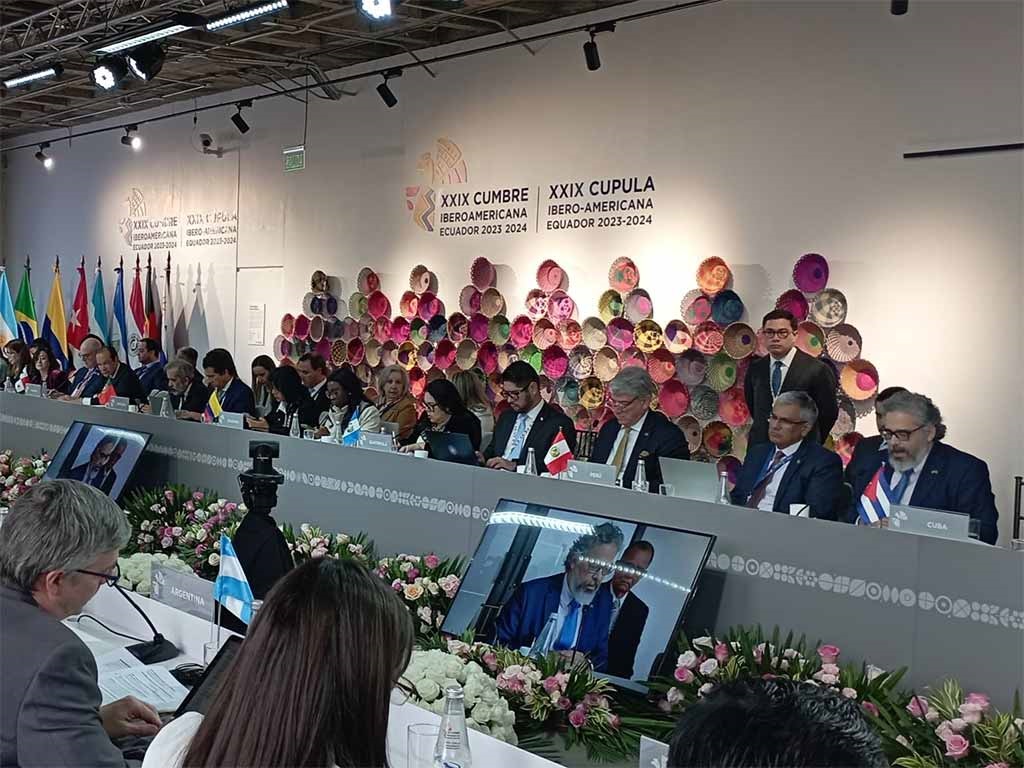In an interview with Prensa Latina, the general director of Multilateral Affairs and International Law at the Cuban Foreign Ministry, Rodolfo Benítez, stressed that at the forum held in Cuenca, Argentina tried to prevent a condemnation of the brutal economic war by the US Government against Cuba.
“No country supported the Argentine position,” said the Cuban representative, who also denounced the “slanderous and arbitrary” inclusion of his country in the unilateral list of nations that, according to Washington, are sponsors of terrorism.
Benítez pointed out that Argentina’s absolute isolation was clearly manifest following the issuing of a Special Declaration in which the rest of nations attending the Summit demanded the end of the economic blockade against the island, followed by a second document in which they requested Cuba’s exclusion from the list of “terrorist countries.”
“Despite Argentina’s shameful performance in Cuenca, constructive dialogue, understanding, unity within diversity, solidarity and safeguarding the valuable heritage of the Ibero-American Conference prevailed, for the benefit of our peoples,” the diplomat stressed.
Although the Ibero-American meeting did not reach a final declaration due to lack of consensus, as has been the practice in previous events of this type, Benítez noted that the it happened precisely because of “Argentina’s obstructionist and inflexible position.”
According to the Cuban diplomat, during the negotiations, Argentina tried to erase the advocation of gender equality and the rights of indigenous peoples, to impose the position that climate change does not exist, and sought to eliminate the commitment to the Sustainable Development Goals of the UN 2030 Agenda from the final documents.
He added that Argentina opposed a statement against hate speech; at the same time it blocked, without support from anyone, communiqués that took months of work on the fight against terrorism, the strengthening of democracy and women’s role in diplomacy, among others.
They went to the extreme attempting to politicize a Declaration that was supported by all other countries, which included solidarity with Cuba after the devastating damage caused by hurricanes Oscar and Rafael, Benítez said.
The Cuban representative and Ibero-American National Coordinator explained that Argentina conveyed its dissent through reservation or disassociation, choices that are usually applied in similar situations.
They went as far as trying to impose a sort of veto to prevent statements on the aforementioned issues, in an attempt widely rejected by all delegations, as they considered it an inadmissible step backwards that threatened the future of the Ibero-American forum, he warned.
In Benítez’s opinion, Argentina came to Cuenca seeking to thwart the Summit, something that comes along with the current objective by authorities in Buenos Aires of weakening and fracturing multilateral forums.
“The current tenants of the Casa Rosada, who strive to make it increasingly “white”, are trying by all means to earn a pat on the back from Washington,” commented the Cuban official.
As they took the floor, the representatives of the South American nation launched attacks against Cuba and other Ibero-American countries, something that the delegation of the island classified as “a smokescreen to divert attention from the shameful role Argentina has been playing in this meeting.”
“We know well that these diatribes against our country do not represent the feelings of the brotherly Argentine people, with whom we share historical ties of friendship and solidarity, which no government in power will be able to erase,” said Benítez.
He considered it “total hypocrisy” for the Argentine authorities to pretend to be concerned about human rights in Cuba and other countries, when they flagrantly violate the rights of their citizens. Despite the tensions raised at the meeting, the head of the Cuban delegation highlighted the importance of the event to address issues such as “innovation, inclusion and sustainability,” the motto of this Summit.
He considered such topics are crucial to face the socioeconomic challenges of the region, such as hunger, poverty and inequality.
However, he warned that these problems cannot be resolved without a change in the current international order, which he described as unjust and exclusive.
ied/jg/rgh/avr










